If you’ve been searching for a landing page builder, you’ve likely come across Unbounce and Shogun. Both tools are well-known in the industry and serve different purposes, but they share one critical goal — helping businesses create high-performing landing pages quickly and efficiently.
While Unbounce focuses primarily on creating conversion-optimized landing pages, Shogun is built to integrate seamlessly with eCommerce platforms like Shopify to design storefronts and product pages.
In this comparison guide, we’ll break down the major differences between Unbounce and Shogun. From pricing and features to ease of use and integrations, we’ll help you determine which tool is the best fit for your business needs.
Keep reading to discover how Unbounce and Shogun stack up against each other.
Major Differences Between Unbounce and Shogun
While Unbounce and Shogun are both powerful tools for building high-quality pages, they serve different audiences and purposes.
Here’s a breakdown of the key differences between the two:
| Feature | Unbounce | Shogun |
|---|---|---|
| Primary Use | Designed for creating landing pages focused on lead generation and PPC campaign optimization. | Tailored for eCommerce businesses to build product pages, storefronts, and online shopping experiences. |
| Target Audience | Marketers, agencies, and businesses focused on driving conversions from paid ads and campaigns. | eCommerce businesses, Shopify store owners, and teams looking to customize online stores. |
| Editor | Drag-and-drop builder with Smart Builder for AI-assisted design. | Drag-and-drop editor optimized for building product pages and storefronts on platforms like Shopify. |
| Templates | 100+ landing page templates categorized for lead generation, SaaS, consultancy, and more. | Pre-built eCommerce templates for product pages, homepages, and sales promotions. |
| A/B Testing | Available in higher plans (starting with Optimize Plan). | Available in higher-tier plans for testing different product and page variations. |
| Integrations | 100+ integrations, including CRM, email marketing, and analytics tools like HubSpot and Salesforce. | Seamlessly integrates with Shopify, BigCommerce, and Magento, along with basic analytics tools. |
| Unique Features | Smart Builder, Smart Copy (AI content generation), and Smart Traffic for conversion optimization. | Advanced eCommerce tools like Page Scheduling, customizable SEO controls, and Analytics Dashboards. |
| Pricing | Starts at $90/month ($81/month billed annually) for the Launch Plan. | Starts at $39/month for the Build Plan, with advanced features in higher-priced plans. |
Key Takeaways:
- Purpose: Unbounce is best suited for businesses running lead-generation campaigns through landing pages, while Shogun is specifically designed for eCommerce websites looking to enhance their online store experience.
- Templates: Unbounce offers templates tailored for marketing and conversion-focused landing pages, while Shogun provides templates optimized for product pages and storefronts.
- Audience: Unbounce targets marketers and businesses seeking higher ad campaign conversions, whereas Shogun focuses on online store owners who need to customize their Shopify or BigCommerce pages.
- Integrations: While Unbounce integrates with a broader range of marketing and CRM tools, Shogun specializes in integrations with eCommerce platforms like Shopify and Magento.
By understanding these key differences, you can decide which tool aligns better with your business goals: whether you’re optimizing for landing page conversions with Unbounce or enhancing your eCommerce storefront with Shogun.
How Do The Landing Page Builders Compare?
Unbounce
Unbounce’s landing page builder is highly intuitive and designed specifically to create pages that drive conversions. Its drag-and-drop editor allows you to build professional landing pages effortlessly by simply selecting elements like text, images, buttons, or forms from the sidebar and placing them anywhere on the page.
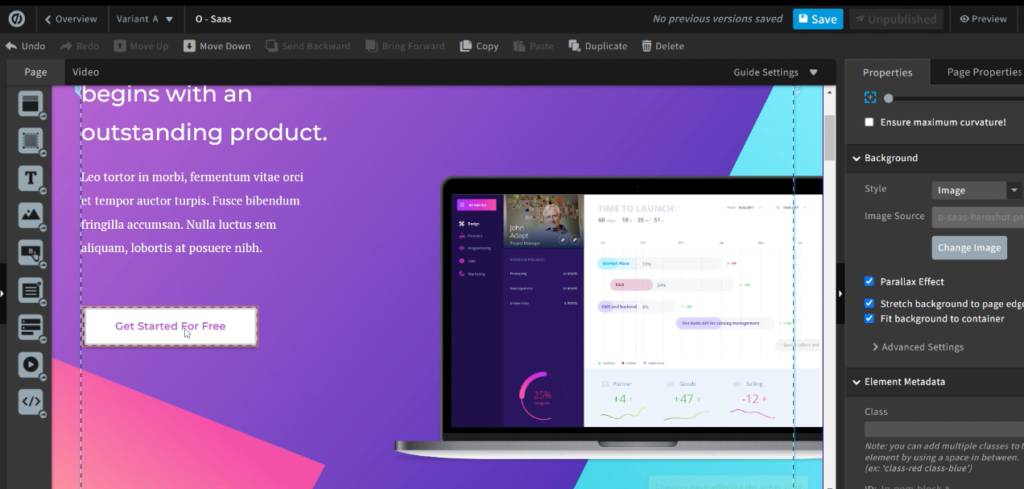
Unlike many other tools, Unbounce’s editor doesn’t confine you to a grid or pre-defined layout, offering complete freedom to design your page as you see fit.
A standout feature of Unbounce is its Smart Builder, an AI-assisted tool that simplifies the process even further. By inputting your goals and audience details, Smart Builder generates optimized layouts tailored to your campaign objectives. This saves time and ensures your pages are strategically designed to convert.
Unbounce also provides the flexibility to easily toggle between desktop and mobile views, so you can customize how your page appears on different devices. This ensures your landing pages are responsive and visually appealing across screens of all sizes.
In addition to the intuitive design, Unbounce includes an SEO properties tab within the editor. This feature allows you to add metadata, adjust titles, and even hide your pages from search engines, giving you control over visibility on search results.
Shogun
Shogun’s landing page builder takes a slightly different approach, focusing primarily on creating pages for eCommerce platforms like Shopify, BigCommerce, and Magento. Its drag-and-drop editor is equally powerful and offers a seamless design experience, making it easy to build and customize product pages, storefronts, and promotional landing pages.
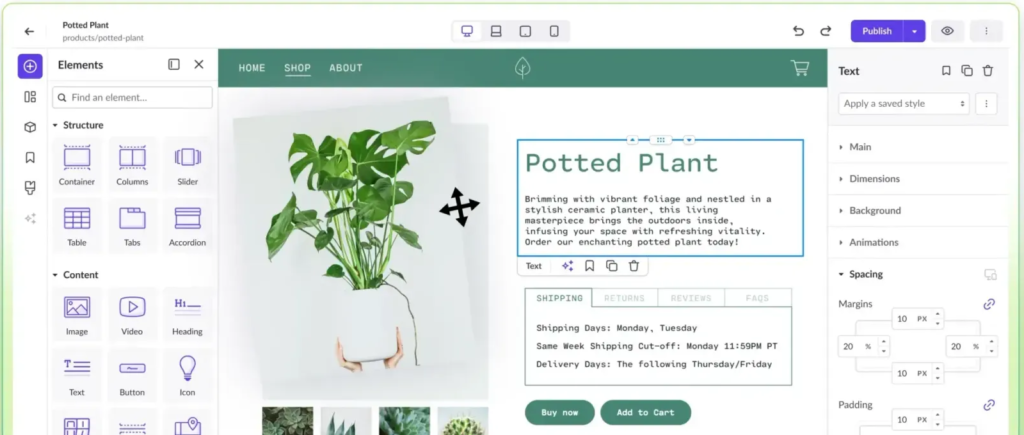
One of Shogun’s biggest strengths is its focus on precision. Much like Unbounce, Shogun’s editor allows you to move elements freely without being restricted to grids. However, Shogun also introduces features like alignment controls and grouping tools that give you added precision when arranging page elements. These features ensure your page looks clean, professional, and perfectly spaced.
Shogun is built with eCommerce responsiveness in mind. You can customize your pages for both desktop and mobile views to ensure an exceptional user experience across all devices. Additionally, Shogun’s editor includes advanced SEO controls, allowing you to customize metadata, optimize images, and structure your pages for better search visibility.
Where Shogun truly shines is its ability to integrate directly with eCommerce platforms. Whether you want to design custom product pages, optimize category pages, or create special promotional sections, Shogun provides the tools to transform your online storefront into a high-performing, visually appealing experience.
While Unbounce focuses on creating conversion-driven landing pages for marketing campaigns, Shogun tailors its experience toward eCommerce stores, making it ideal for businesses looking to enhance their product pages and overall storefront design.
Unbounce vs Shogun: Unique Features
Unbounce
Unbounce stands out in the market due to its AI-powered tools and focus on conversion optimization. One of the most notable features is the Smart Builder, which uses artificial intelligence to design landing pages tailored to your goals. By analyzing your campaign objectives, audience, and industry, Smart Builder provides pre-optimized layouts that streamline the page creation process.
Another powerful feature is Smart Traffic, Unbounce’s AI-driven tool that automatically directs visitors to the variant of your landing page that’s most likely to convert. Instead of relying on manual A/B testing, Smart Traffic analyzes user behavior and dynamically adapts to improve conversion rates over time.
Unbounce also includes Dynamic Text Replacement, a feature particularly useful for marketers running PPC campaigns. This tool automatically updates the text on your landing page to match the keywords in your ads, ensuring relevance and consistency that can significantly improve ad performance and conversions.
In addition to these smart features, Unbounce offers a wide range of customizable templates tailored for different use cases, from lead generation to product showcases. Combined with A/B testing capabilities, you can fine-tune every element of your page to identify the most effective version for your audience.
Shogun
Shogun sets itself apart with its eCommerce-first approach and unique tools that cater specifically to online store owners. A key feature of Shogun is its Page Scheduling capability, which allows users to plan and publish pages at specific times. This is particularly useful for seasonal campaigns, product launches, and promotions, ensuring pages go live exactly when needed.
Another standout feature is Customizable SEO Controls. Shogun provides advanced tools to optimize metadata, URLs, and images for search engines, giving eCommerce businesses more control over how their pages perform on SERPs. This level of SEO customization is critical for driving organic traffic to product and category pages.
Shogun’s Analytics Dashboard is another unique offering, delivering insights into page performance, user behavior, and conversions. With access to detailed data, businesses can monitor which pages drive the most engagement and identify areas for improvement to enhance the customer experience.
For users managing multiple pages, Content Blocks simplify the design process. These reusable, customizable sections allow you to save headers, footers, testimonials, or product sections and apply them across different pages, saving time and ensuring consistency throughout your storefront.
While Unbounce prioritizes AI tools for marketing-focused pages, Shogun’s unique features cater specifically to eCommerce businesses looking to enhance their online store’s performance and functionality.
Unbounce vs Shogun: Templates
Unbounce
Unbounce offers over 100+ professionally designed templates specifically crafted for conversion-focused landing pages.
These templates are categorized based on various use cases, such as lead generation, click-through pages, coming soon pages, and industry-specific templates. This organization makes it easy to find the right design that aligns with your campaign objectives.
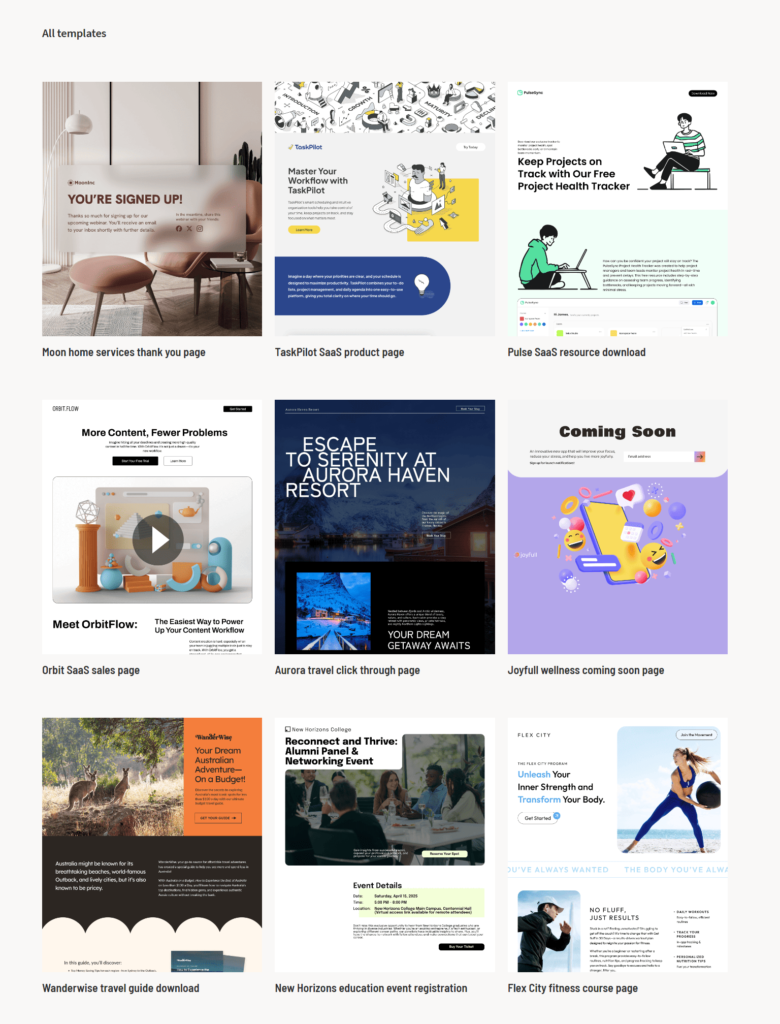
The templates are fully customizable, allowing users to tweak every element to match their branding and campaign goals. Whether it’s changing fonts, colors, or adding custom images, Unbounce gives you complete control over the look and feel of your pages.
Another advantage is that all Unbounce templates are responsive, ensuring they look great on both desktop and mobile devices. You can easily switch between views within the editor and make adjustments for mobile optimization to enhance user experience across all screens.
If the built-in templates are not enough, Unbounce allows you to explore additional designs through ThemeForest Marketplace, where you can purchase premium templates for even more variety. This added flexibility ensures that businesses have a wide range of options to choose from when creating high-converting landing pages.
Shogun
Shogun takes a more eCommerce-focused approach to templates, offering a library of pre-built designs tailored specifically for product pages, homepages, and promotional landing pages. These templates are optimized to work seamlessly with platforms like Shopify, BigCommerce, and Magento, giving eCommerce businesses a solid foundation to start from.
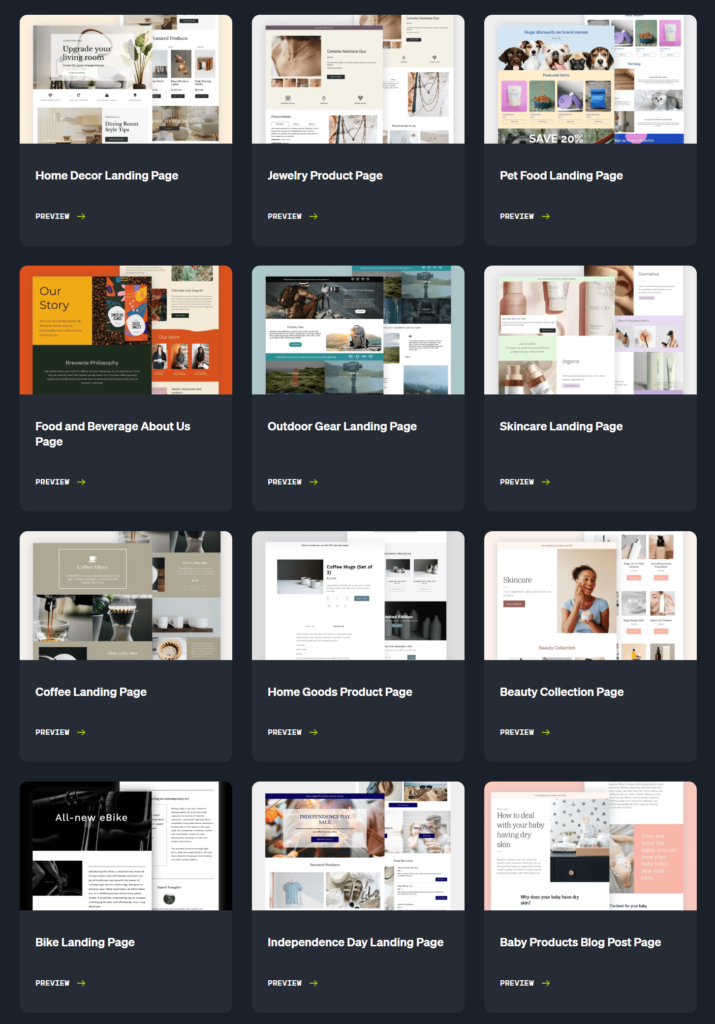
Shogun’s templates focus heavily on visual appeal and product presentation, allowing online store owners to highlight their products with clean, modern designs. Templates can be customized down to the finest detail using the drag-and-drop editor, providing flexibility to showcase products, reviews, and calls-to-action in a way that resonates with customers.
While Shogun does not offer as many templates as some landing page builders, its emphasis on eCommerce usability makes its designs highly practical for online retailers. Additionally, businesses can save their own custom sections as Content Blocks and reuse them across multiple pages, creating consistency throughout the storefront.
Every Shogun template is fully responsive, ensuring that product pages and storefronts are mobile-friendly. This responsiveness is critical for eCommerce businesses, where a significant portion of purchases happen on mobile devices.
While Unbounce focuses on conversion-optimized templates for landing pages, Shogun prioritizes product-focused templates tailored to enhance online shopping experiences. Both tools provide customization options, but their template libraries reflect the unique priorities of their respective audiences.
Unbounce vs Shogun: Building Pages At Scale
Unbounce
Unbounce offers several features that simplify the process of building landing pages at scale, making it a strong choice for businesses running multiple campaigns or working with numerous clients.
One of the most valuable tools for scaling is Smart Builder, which allows you to quickly generate optimized landing pages by leveraging AI-based suggestions. By inputting your goals and audience, Smart Builder produces a layout tailored for conversions, reducing the time needed to create each page.
For teams managing multiple campaigns, Unbounce enables users to duplicate landing pages with a single click. Instead of building new pages from scratch, you can reuse successful designs, make minor adjustments, and launch variations in minutes. This functionality is especially useful for businesses running similar campaigns targeting different audiences.
Unbounce also supports multi-user permissions, allowing teams to collaborate efficiently. Campaigns can be organized into groups, helping agencies and larger businesses manage clients’ projects from a single account. In addition, Unbounce allows you to archive or transfer inactive pages and campaigns without deleting them permanently, ensuring that your workspace remains organized.
Another noteworthy feature is the ability to export leads from your Unbounce pages as CSV files. This simplifies the process of transferring leads into marketing automation tools or CRM platforms, helping businesses streamline lead management and nurture campaigns.
With its duplication tools, user management capabilities, and AI-driven page creation, Unbounce is well-suited for building landing pages at scale, particularly for marketing teams and agencies focused on conversion campaigns.
Shogun
Shogun is designed to help eCommerce businesses build and manage product pages, storefronts, and landing pages at scale. One of its standout tools for scaling is Content Blocks. With this feature, users can create custom blocks or sections—such as headers, footers, testimonials, or product showcases—and save them for reuse across multiple pages. This not only speeds up the design process but also ensures consistency throughout the store.
Another feature that supports scaling is Page Scheduling, which allows users to plan and publish pages automatically. This is especially beneficial for seasonal promotions, product launches, and time-sensitive campaigns, as it eliminates the need for manual intervention. Pages can be scheduled to go live and taken down at specified times, giving eCommerce teams more flexibility and control.
Shogun also simplifies page duplication. If you’ve created a high-performing product page or landing page, you can quickly duplicate it and make slight modifications to suit different products or campaigns. This feature is particularly useful for eCommerce businesses with extensive product catalogs.
For larger teams, Shogun supports collaboration workflows, enabling multiple users to work on pages simultaneously. Teams can maintain design consistency across pages and collaborate efficiently to build and optimize the storefront experience.
Shogun’s ability to scale extends to its integration with platforms like Shopify and BigCommerce, which allows businesses to manage their online stores seamlessly while using Shogun’s tools for customization.
While Unbounce focuses on scaling through AI-driven tools and campaign management features, Shogun excels at helping eCommerce teams streamline the creation of product pages, manage reusable content blocks, and plan large-scale campaigns with advanced scheduling. Both tools are effective for scaling, but their solutions are tailored to the unique needs of their target audiences.
Unbounce vs Shogun: A/B Testing
Unbounce
Unbounce makes A/B testing an integral part of its platform, helping marketers optimize their landing pages for maximum conversions. Available starting with the Optimize Plan, this feature allows you to create multiple variants of a page and test them against each other to see which one performs best.
Setting up an A/B test in Unbounce is straightforward. Once you’ve built your landing page, you can duplicate it and make adjustments—whether that’s changing a headline, button placement, images, or any other element. Unbounce then splits traffic between the different variants and provides detailed performance metrics, such as conversion rates and click-through rates.
The platform also provides real-time insights, allowing you to monitor how each variant is performing and make data-driven decisions to improve your campaigns. For marketers running paid ads or PPC campaigns, A/B testing is particularly useful for optimizing landing pages to align with specific keywords, ad copy, or target audiences.
What sets Unbounce apart is its Smart Traffic feature, which takes testing to the next level. Instead of relying solely on manual A/B testing, Smart Traffic uses AI-driven analysis to identify the best-performing variant for each visitor segment. Over time, this feature automatically directs traffic to the page most likely to convert, removing the need for constant monitoring and manual optimization.
With its easy-to-use testing tools, real-time analytics, and AI-powered Smart Traffic, Unbounce ensures that businesses can continually refine their landing pages to achieve higher conversion rates.
Shogun
Shogun’s A/B testing capabilities are specifically designed with eCommerce businesses in mind. Available in Shogun’s higher-tier plans, this feature allows store owners to test variations of product pages, landing pages, and even elements like headlines, product descriptions, images, or call-to-action buttons.
Setting up an A/B test in Shogun is seamless. Once you’ve created your control version of a page, you can duplicate it and adjust specific elements to create a variant. Shogun will then split the traffic between the two versions, allowing you to analyze which version drives more conversions, click-throughs, or purchases.
What makes Shogun’s A/B testing particularly useful is its deep integration with eCommerce platforms like Shopify and BigCommerce. This ensures that you can directly track metrics that matter most for online stores, such as product sales, add-to-cart rates, and revenue generated from each version of a page.
Shogun also provides performance analytics within its dashboard, offering clear insights into how each variant is performing. These insights make it easy for businesses to optimize product pages and storefronts to enhance the customer shopping experience.
While Shogun’s A/B testing is highly effective for eCommerce-focused goals, it does require access to its more expensive plans, which may be a drawback for smaller businesses. However, for growing eCommerce stores looking to refine their product pages and improve conversions, Shogun’s A/B testing tools are an invaluable addition.
In comparison, Unbounce’s A/B testing shines for general landing page optimization with its Smart Traffic feature automating the process for marketers. Shogun’s A/B testing, on the other hand, is tailored for eCommerce performance metrics, helping online store owners fine-tune product pages and drive more sales. Both tools deliver robust testing capabilities but are designed to meet the unique needs of their respective audiences.
Unbounce vs Shogun: Integrations
Unbounce
Unbounce offers an extensive range of integrations that cater to marketers looking to streamline their workflows and improve campaign performance. With over 100 native integrations, Unbounce connects seamlessly with popular CRM systems, email marketing platforms, analytics tools, and automation software. This ensures businesses can sync their landing pages with their existing marketing technology stack.
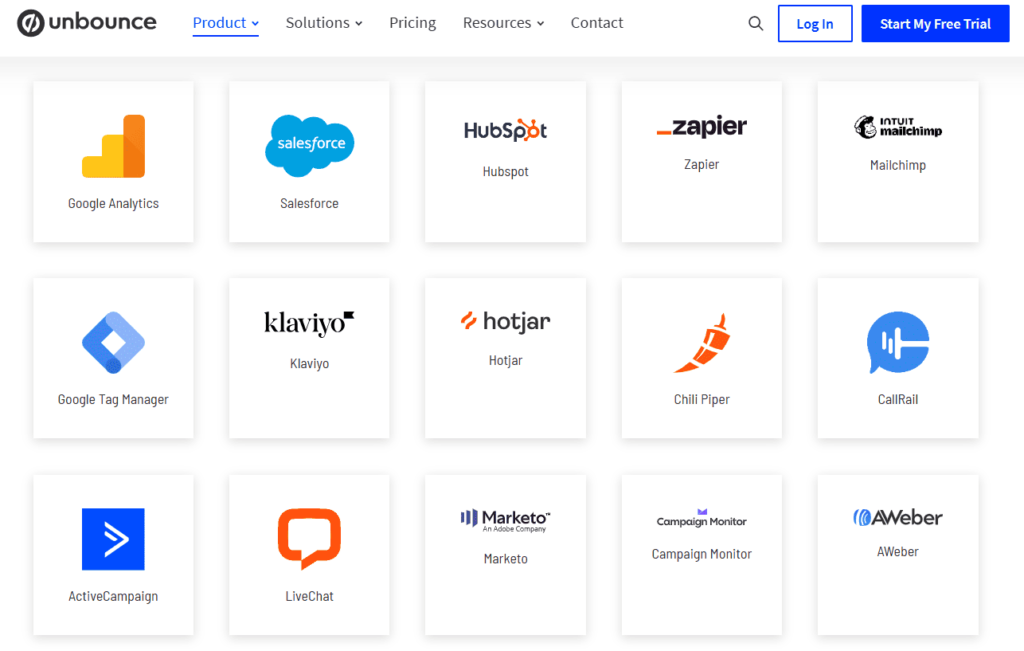
Some of the most notable integrations include HubSpot, MailChimp, Salesforce, Marketo, and Campaign Monitor, enabling users to capture leads and manage customer data effortlessly. Unbounce also integrates with tools like Google Analytics, Hotjar, and Crazy Egg, which provide additional insights into user behavior, such as clicks, scroll depth, and conversions.
For businesses that require more flexibility, Unbounce connects with Zapier, giving users access to thousands of third-party applications. This expands the range of automation possibilities, such as sending leads to custom CRMs, triggering email campaigns, or syncing data across platforms without any coding knowledge.
Although Unbounce lacks some native eCommerce integrations, its wide array of marketing-focused tools makes it a strong choice for businesses running paid campaigns or lead generation efforts. Additionally, integrations like Slack and GoToWebinar make it easy for teams to collaborate and manage events directly from their landing pages.
Shogun
Shogun’s integrations are specifically built for eCommerce businesses, with a strong focus on enhancing online store functionality. Unlike Unbounce, which is marketing-centric, Shogun connects seamlessly with leading eCommerce platforms like Shopify, BigCommerce, and Magento, making it ideal for creating custom storefronts and product pages.
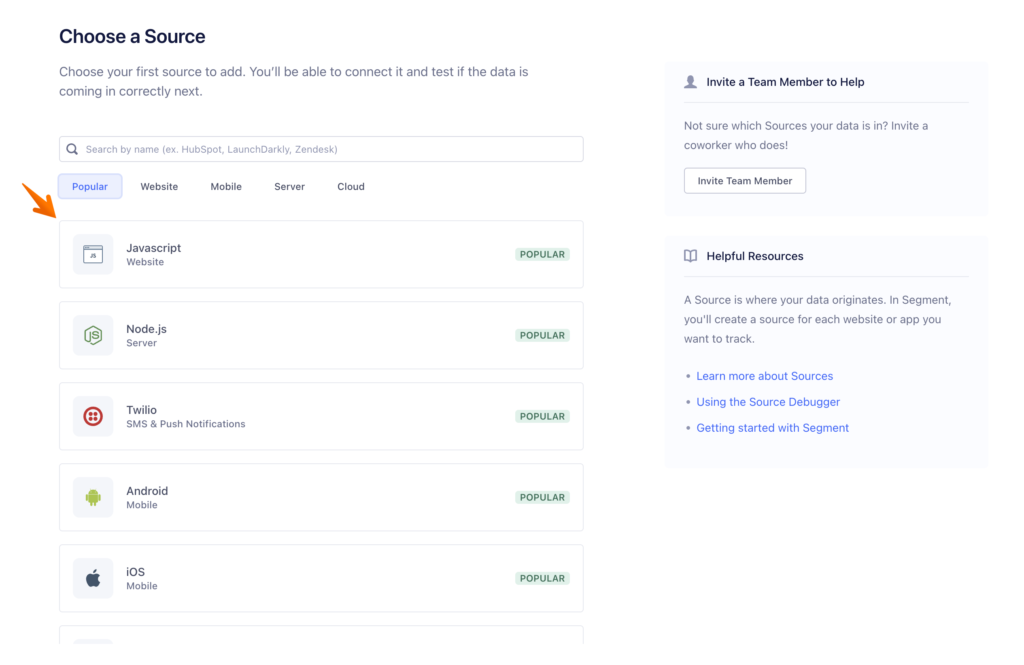
One of Shogun’s standout integrations is its direct connection with Shopify’s product data, allowing users to build pages using real-time inventory, product descriptions, and pricing. This integration ensures that product pages remain up-to-date without manual adjustments.
In addition to eCommerce platforms, Shogun integrates with tools like Google Analytics and Facebook Pixel to help businesses track key performance metrics such as conversions, revenue, and user behavior. These insights are crucial for optimizing product pages and improving the overall customer shopping experience.
Shogun also supports custom integrations for advanced users through its API. This allows businesses to connect Shogun with other tools, such as email marketing platforms, inventory management systems, and more, providing flexibility for unique workflows.
While Shogun offers fewer general integrations than Unbounce, its eCommerce-specific tools and deep platform integrations make it a powerful solution for online retailers looking to enhance their storefronts and optimize performance.
In comparison, Unbounce focuses on integrations that align with marketing automation, lead management, and analytics, making it ideal for campaigns and paid ads. Shogun, on the other hand, prioritizes seamless eCommerce integrations for Shopify, BigCommerce, and similar platforms, giving online store owners the tools they need to manage and optimize their product pages effectively.
Unbounce vs Shogun: Pricing Plans
Unbounce
Unbounce offers four pricing plans to cater to businesses of varying sizes and needs, with an emphasis on scaling features as you move up the tiers. All plans include unlimited pages, unlimited subdomains, unlimited popups and sticky bars, and built-in AI copywriting.
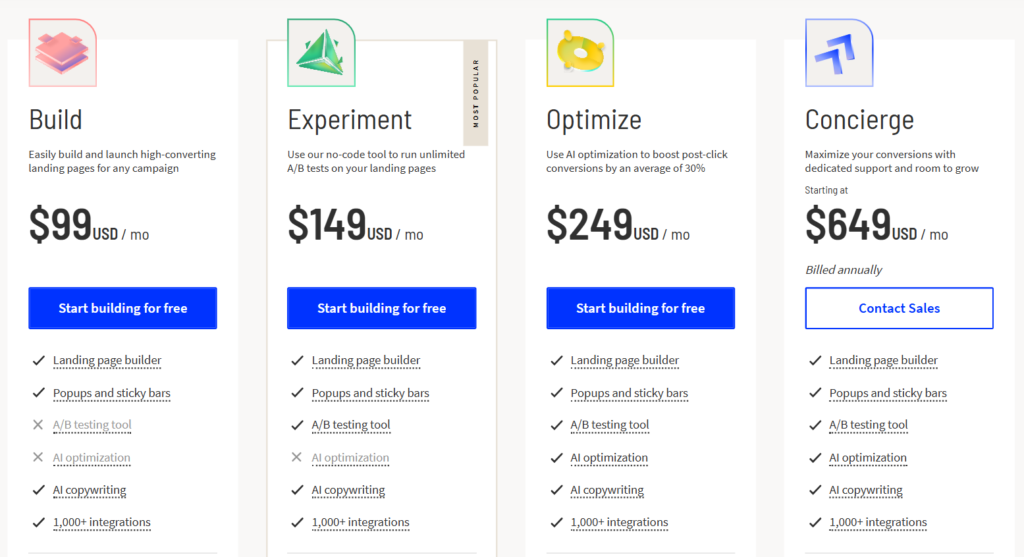
The Build Plan starts at $99 per month and allows up to 20,000 visitors, 1 root domain, and 1 user. It includes essential features like the drag-and-drop builder, popups, sticky bars, and over 100 templates.
The next tier, the Experiment Plan, is priced at $149 per month and allows up to 30,000 visitors, 2 root domains, and 3 users. This plan builds on the features of Build, adding A/B testing, dynamic text replacement, and advanced reporting capabilities like Conversion Insights.
The Optimize Plan costs $249 per month and supports up to 50,000 visitors, 3 root domains, and 5 users. It includes everything in Experiment plus features like AI Traffic Optimization, Advanced Targeting, and Page Scheduling for campaigns.
For agencies and large teams, Unbounce offers the Agency Plan, starting at $499 per month (billed annually). This plan accommodates traffic starting at 100,000 visitors, 20 root domains, and 10 users. It also provides premium support, implementation services, and the ability to manage large-scale campaigns with advanced tools.
Unbounce offers a 14-day free trial across all plans, allowing businesses to explore the platform before committing. While the entry-level plan can be pricey for smaller businesses, Unbounce’s advanced features like AI optimization and A/B testing make it a compelling option for marketers focused on conversions.
Shogun
Shogun provides three pricing plans tailored specifically for eCommerce businesses, with features increasing in scale and capabilities across the tiers. All plans are designed to help users customize online stores, optimize product pages, and improve overall performance.
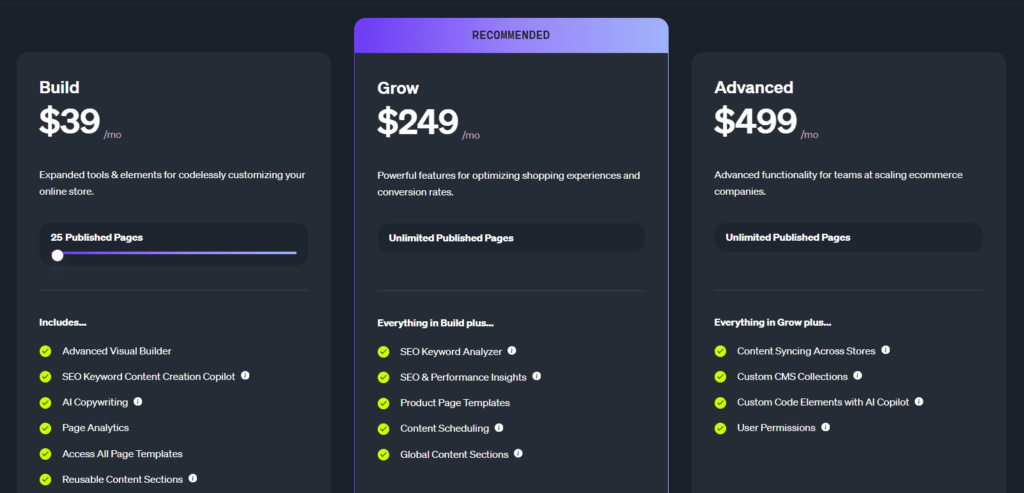
The Build Plan is priced at $39 per month and allows for up to 25 published pages. It includes core features like the Advanced Visual Builder, AI Copywriting, SEO Keyword Content Creation Copilot, Page Analytics, and access to all pre-built templates. Users can also create Reusable Content Sections, saving time when scaling product pages.
The Grow Plan, recommended for growing eCommerce businesses, costs $249 per month and includes unlimited published pages. This plan builds on the features of Build, adding tools like SEO Keyword Analyzer, Product Page Templates, Content Scheduling, and Global Content Sections. Additionally, users can access advanced analytics for SEO and performance insights, helping optimize pages for higher conversions.
At the top tier, the Advanced Plan is priced at $499 per month and is designed for larger teams and enterprise-level eCommerce businesses. It includes everything in Grow plus advanced functionality like Content Syncing Across Stores, Custom CMS Collections, and Custom Code Elements with AI Copilot. The plan also supports user permissions, ensuring better team collaboration and control.
Shogun’s pricing starts at a more accessible rate than Unbounce, with its Build Plan at $39/month, making it a cost-effective option for small businesses. However, advanced tools like A/B testing and personalization are included in the higher plans, which are more aligned with growing or large-scale eCommerce operations.
While Unbounce focuses on conversion optimization for marketing campaigns, Shogun prioritizes features that enhance eCommerce storefronts. Both platforms offer scalable pricing models, but their plans reflect their unique target audiences and purposes.
Is There A Better Platform?
Choosing between Unbounce and Shogun ultimately comes down to your specific business needs. Both tools excel in their respective areas, but they target different audiences and offer unique advantages.
If your primary focus is lead generation and running high-conversion campaigns through landing pages, Unbounce is the superior option. With features like Smart Builder, Smart Traffic, and dynamic text replacement, Unbounce ensures your pages are optimized for PPC ads and paid campaigns. It’s a platform tailored for marketers, agencies, and businesses that rely heavily on driving conversions through well-crafted landing pages.
On the other hand, if you’re running an eCommerce store and need a tool to customize product pages, storefronts, and promotional pages, Shogun is the better choice. Its deep integration with platforms like Shopify, BigCommerce, and Magento, along with advanced tools like Content Scheduling, reusable Content Blocks, and SEO optimization, make it ideal for businesses looking to enhance their online store experience.
For smaller businesses or startups looking for an affordable solution, Shogun’s Build Plan at $39/month offers excellent value with features like AI copywriting and page analytics. Meanwhile, Unbounce’s entry-level Build Plan at $99/month might be out of reach for those on a tight budget.
That said, there are also alternative platforms that cater to both marketers and eCommerce store owners, such as Landingi, Leadpages, or Instapage. For example, Landingi offers competitive pricing, unlimited conversions, and a user-friendly interface, making it a strong alternative for businesses looking to save on costs without sacrificing functionality.
Ultimately, the best platform depends on your goals. For lead generation campaigns and landing page optimization, Unbounce stands out as the go-to tool. For eCommerce customization and storefront enhancements, Shogun delivers the best results. If neither platform fully aligns with your needs, exploring alternatives like Landingi or Leadpages could provide a solution that balances functionality and budget.
Evaluate your priorities—whether they’re marketing campaigns or online store performance—and choose the platform that aligns best with your business objectives.
Frequently Asked Questions
What is Unbounce best suited for?
Unbounce is ideal for marketers, businesses, and agencies focused on creating high-converting landing pages. Its features, such as Smart Builder, A/B testing, and dynamic text replacement, make it particularly valuable for running PPC campaigns and improving lead generation.
What is Shogun best suited for?
Shogun is specifically built for eCommerce businesses looking to customize their online storefronts and product pages. With its seamless integration with platforms like Shopify and BigCommerce, Shogun allows users to create visually stunning pages that improve shopping experiences and drive sales.
How much does Unbounce cost?
Unbounce pricing starts at $99 per month for the Build plan and goes up to $499 per month for the Agency plan, depending on features, traffic volume, and the number of users or domains. There is also a 14-day free trial available for all plans.
How much does Shogun cost?
Shogun pricing starts at $39 per month for the Build plan and scales up to $499 per month for the Advanced plan. Pricing varies based on the number of published pages, collaboration features, and advanced functionalities like content syncing and custom CMS collections.
Does Unbounce or Shogun offer A/B testing?
Yes, both platforms include A/B testing capabilities. Unbounce offers A/B testing starting with the Experiment Plan at $149 per month, along with its AI-driven Smart Traffic feature. Shogun also includes A/B testing, but it is available in the Grow Plan and higher tiers, making it ideal for optimizing product and storefront pages.
Read more related article:
Unbounce Discount Code: Get Upto 35% Discount